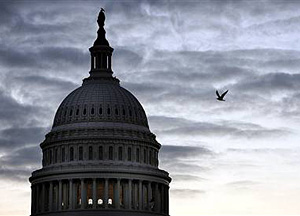 |
 |
 |
 Editorials | January 2007 Editorials | January 2007  
Speaking Out Now Against the Iraq Disaster Is Too Little, Too Late
 Cynthia Tucker - Baltimore Sun Cynthia Tucker - Baltimore Sun


| | Change in the Air? The latest polls dont bode well for the GOP. (Marl Wilson/Getty) |
With President Bush's decision to send more U.S. troops to Iraq, it becomes clear that Gen. Eric K. Shinseki was right all along.

In February 2003, weeks before the invasion began, General Shinseki, then the U.S. Army chief of staff, testified at a Senate hearing that "several hundred thousand soldiers" would be needed to pacify Iraq after the early rounds of combat. For his candor, he was attacked, defamed and denounced by Bush administration officials, retiring with his reputation in tatters.

Only in the movies, it turns out, do the good guys - the courageous, self-sacrificing types - get the glory. In the real world, they get hammered.

That helps explain why General Shinseki was such a lonely voice back then. If last spring's "generals' revolt" was any indication, there were plenty of military men who saw trouble in Donald H. Rumsfeld's pared-down war plans. But they cowered before the condescending secretary, afraid to question his assumptions even in private meetings.

Retired Maj. Gen. John Baptiste, who once commanded the 1st Infantry Division in Iraq, said last fall that Mr. Rumsfeld threatened to fire the next person who mentioned postwar plans. So they shut their mouths to keep their jobs. There were many officials - military officers, intelligence experts, strategic thinkers - who doubted the rationale for the war in Iraq or the planning for it. But few were willing to risk their careers by speaking up.

Intelligence professionals knew there were no close links between Osama bin Laden and Saddam Hussein. Military strategists knew that postwar operations demanded contingency planning and expertise that the Bush administration resisted. But most kept their doubts to themselves.

That includes then-Secretary of State Colin L. Powell, who sold the war to a wary public in a speech before the United Nations in February 2003. He has since voiced regrets about that speech, but it's too late.

The same goes for all those Democratic senators who seem to want do-overs on their war votes. The record cannot be retracted or erased; the invasion cannot be recalled.

And therein lies our profound difficulty. There is no chance for "victory" or "success" in Iraq at this late date, and little chance for even averting disaster. What is done cannot be undone. There is no "way forward."

The U.S. invasion of Iraq fractured a fragile society, set off a cycle of retribution that may go on for years and emboldened Iran. We cannot fix the mess we've made. The best we can hope for is that the rest of the Middle East is not sucked into the maelstrom.

The moment for political courage came and went. Those who could not summon it then, those who failed to speak out when their nation most needed them, find that there is nothing they can do to make up for that failing.

In retrospect, it's not clear that President Bush could have been pushed back from his disastrous insistence on toppling Mr. Hussein, even if he had met firmer opposition. Given his continued resistance to reality, it's unlikely.

Still, wouldn't Sen. John Kerry, a combat veteran, have better served his nation if he had given a rousing speech on the floor of the Senate denouncing the invasion and then voted against it? The Massachusetts Democrat would have been called a coward and worse. But he could have plainly made the case that needed to be made: Invasion was not in the national interest.

And wouldn't Mr. Powell have done more good if he had resigned rather than give that speech to the United Nations? He was perhaps the most trusted member of the Bush administration at the time; his resignation would have spoken volumes about the folly of invasion.

But maybe that sort of thing makes grand movies because it is so very rare.

Cynthia Tucker is editorial page editor for The Atlanta Journal-Constitution. | 
 | |
 |



